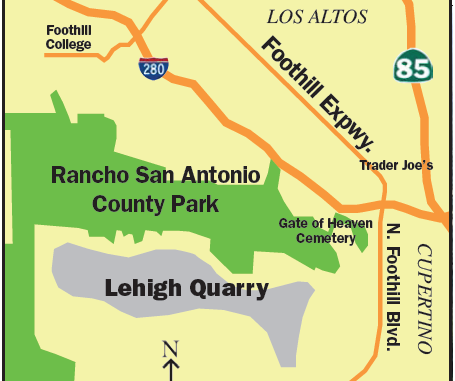
BY BRADEN CARTWRIGHT
Daily Post Staff Writer
The Lehigh Cement Plant and Quarry announced today (Nov. 14) that it is shutting down its cement plant in the hills above Los Altos after 83 years, but the company will continue its mining operations.
Supervisor Joe Simitian — who has called on Santa Clara County to buy the 3,510-acre property because of Lehigh’s history of environmental violations — celebrated the announcement, but said there is still more work to do.
“This is an opportunity to adapt and envision a new future for the site,” he said in a statement. “A future that I hope will build on the three pronged-vision with which I began: cement plant closure, a cessation of quarry activities, and restoration of the site.”
The cement plant open in 1939, and its concrete has been used in major construction projects such as the Golden Gate Bridge, the Shasta Dam and the San Jose International Airport.
But in the last decade, the company has received 2,135 violations and $2.5 million in fines for violating permits, expanding mining areas, being too loud and polluting water, soil and air, according to a report from Santa Clara County released in May. At least 100 violations were serious.
Among them, Lehigh discharged selenium, mercury and nickel into ponds and moved endangered frogs without a permit, the report found.
The company will continue to mine limestone and aggregate, which is a blend of materials used in construction.
“Lehigh recognizes the need for sustainable materials in the local marketplace, and will continue to focus on its aggregates and material distribution operations at the plant, prioritizing safety and compliance,” spokesman Jeff Sieg said in a statement.
The cement plant hasn’t operated since April 2020.
Simitian said this fact makes him confident that the region can “continue to thrive” as it shifts from producing to importing cement.
Simitian’s focus on the quarry started after Lehigh applied to expand its operation in May 2019 by removing a chunk of a ridge line next to the Rancho San Antonio open space preserve.
Lehigh sued the county last year over delays in the permit application, but a judge ruled in the county’s favor.
Lehigh said today that it will submit a new application, signaling the expansion plans have been abandoned.
“Abandonment of that application is good news for the community,” Simitian said.
Simitian has suggested that the county buy the property using eminent domain, a process in which the government takes private land for a public purpose He said the county could then restore the area for open space, recreation and housing.
“If we can do two good things at the same time — create a little bit more housing in a housing shortage like the one we’re confronting today and preserve the vast, vast majority of the site for open space and recreation – that might end up being a winner all around,” he said at a Board of Supervisors meeting in March.
The cost for restoring the site when Lehigh is done with the quarry and cement plant is estimated at $60 million to $100 million. One strategy the county could use to acquire the land would be to forgive Lehigh for the restoration costs in exchange for the land to the county at a reduced cost, Simitian said.
The board’s Housing, Land Use, Environment, and Transportation Committee will talk about the future of Lehigh on Thursday.

Let the skyscrapers begin!
This action is long overdue. Not too many years ago, the Lehigh cement plant was emitting over 1200 pounds of mercury– a known neurotoxin–into the air every year. The plant has also been a significant source of greenhouse gases and other harmful emissions. Thanks to pressure from local activists like Bay Area for a Clean Environment (BACE), Lehigh was required to install pollution controls to reduce the plant’s emissions. But it wasn’t until a major accident crippled the plant two years ago, that it ceased operation entirely. The company has realized that rebuilding the plant is not economically viable, so has finally decided to shut it down permanently. But mining operations and production of aggregate for sale, which generates substantial truck traffic and is its own source of pollution, wil continue.